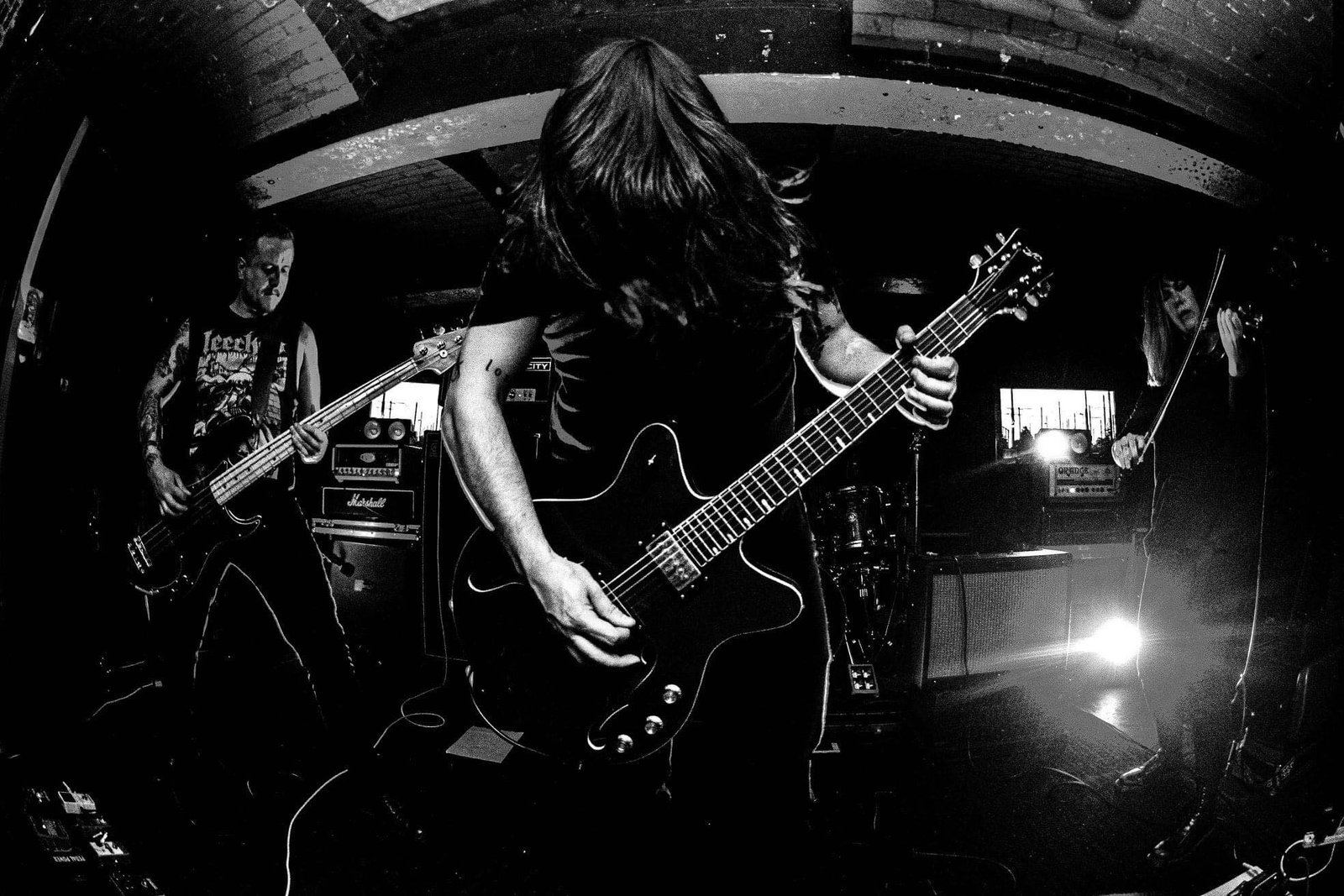I’d like you to consider, for a moment, that you stand alone atop a barren precipice. Before, and all around you, exists the essence of life executed in the most enthralling hues, every memory expressed in vivid cognition. As you gaze in all directions and find your imagination lost among the lapping waves of emotion, you reach out and feel the infinite capacity of life, from its lowest ebbs of grief to its euphoric zenith. This overwhelming cascade of sensory information echoes from your fingertips, through the bones of every extremity, and wrestles your heart in an irrepressible embrace. In a moment frenzied and unyielding, and in the next serene with halcyon recollection.
Perhaps it is beyond our lucid capacities to experience such an abstract embodiment of the human condition at any specific moment, try as we might through art. It’s for this reason that bands existing under the now broad umbrella of post-metal can offer such an enlightening glimpse into our intrinsic emotional response. Pijn are one such band, and indeed one of the finest examples of spiritual expression in modern extreme music. A transcendent project that currently boasts two EPs, one album, one remix album, and one collaborative mini-album, Pijn may well already be on your radar. If they aren’t, however, now is the time to put that right.
Eschewing convention and using artistry as a means of reflecting our innermost sensations are part and parcel of the genre this band loosely inhabits, yet they do so with an unrivalled cinematic grandeur. Their moments of outright post-metal fire are integrated into divergences of lap-steel-led, noir-western soundscapes and spectral ambient eclipses. As purveyors of a genre that prides itself on its rejection of familiarity, this is a band that authentically realises this concept like no other. So much so that any label you can ascribe to this band feels unfairly reductive.
Pijn was originally founded in Manchester, UK, in 2016, in the now heralded No Studio, as a two-piece studio project consisting of producer and guitarist Joe Clayton (previously of Old Skin) and drummer Nic Watmough (previously of Esoteric Youth). Utilising an experimental collaborative approach, the duo put together demos that laid the foundation for their debut release, which would feature collaborations from no less than eight additional musicians, including the soon-to-be third permanent core member, bassist Luke Rees. This approach would become a focal aspect of the band moving forward, enlisting the talents of countless friends in the UK underground music scene to collaborate.
Though the majority of writing is attributed to this core, the band treats the process as being fluid, allowing contribution from their wide contingent of guests. It’s also interesting to bear in mind the history of the core, prior to the formation of Pijn. Clayton, Watmough, and Rees have historically seen a heavy involvement in the hardcore and experimental scenes, the latter of which is clearly more prevalent within this project, yet there is no denying the aggressive riffs and overriding angst of the former are a key ingredient of the band’s sound.
Beginning with 2017’s remarkable Floodlit EP, it is clear that their established mindset veered somewhat closer to the ‘conventional’ post-metal blueprint. Anguished vocals bore slightly greater precedence on this earlier release, as did the bottom-heavy guitars that one may compare to the likes of Cult of Luna or Amenra. But already there was a notable hint of mystique, and rejection of structural predictability. Though undoubtedly ‘heavy’ enough to please the post-metal gen pop, the shifting dynamics and tones exceed that of most of their contemporaries, shifting the focus periodically and flowing between sonic highs and lows with a refreshing maturity. One need only hear the opening track, “Dumbstruck & Floodlit”, to understand the expanse in which this band operates.
As a primarily instrumental band, Pijn utilise swathes of harmony and intriguing melodies across a plethora of instrumental timbres to communicate with the listener. What I find most striking about this band, is the ease with which they meld the traditional metal band setup with a host of esoteric instrumentation. Cellos, pianos, and lap steels aren’t exactly unheard of in post-metal, but rarely are they integrated so fluently and earnestly. Often, I hear classical instrumentation in metal records used as gimmick, or at the very least a cheap form of dramatism, yet here they are just as integral as the guitar, bass, and drums. No facet of their repertoire is the product of mindless excess, but finely crafted composition. To be clear, these are a band classified as post-metal, but truly they are so much more.
Clayton’s work as a producer has yielded numerous releases in the UK, such as those by Earth Moves, Wren, and Leeched. His acclaimed work has seen his standing in the UK underground grow indefinitely, but it is with Pijn that his talents as an engineer and mixer are perhaps made clearest. The band’s output has consistently borne a truly unique sonic palette. The focus of each musical moment flows naturally from instrument to instrument, placing an emphasis on the emotional contributions of each. All these moments are captured and rendered with delicate poise, embracing the natural timbres with a stunningly balanced dynamism. It shouldn’t need saying that you will hear no defined verse/chorus structure; instead try to approach each track as a discrete chapter within a novel. These chapters carry their own individual movement, yet within the context of a complete release, their qualities are amplified and given profoundly heightened relevance.
2017’s Tanzaro House, in particular, offers a remarkable insight into the band’s intricacies. Recorded over the course of several live sessions, the EP offers a snapshot of the band as they existed at that particular time. My first reaction to the video, as a fellow musician, was one of awe. Rarely do bands sound this good in pre-recorded studio releases, let alone in a live setting, and especially given the sonic variety of their music. Sure, it was probably very well-rehearsed and engineered with expert precision. Regardless, it captures a magical collection of moments, of a band performing at a creative peak. As they stated along with the release:
‘Due to the awkward and shifting nature of the band, we know that not everyone will see Pijn play the same way twice. We thought it would be nice to capture us as we were in that moment, in that configuration – a few cold days holed up in the studio, playing our songs over and and over. This is us as we were on January 2/3, 2017.’
Loss, the band’s debut album, perhaps stands as the pinnacle of their achievement thus far. Released in October of 2018, the album weaves every facet of grief into a fantastic but solemn tapestry, which is dedicated to the concept of its namesake. The album received considerable praise upon its release – not only for its mastery of primitive emotional storytelling, but also for its truly unique sonic identity. The team of writers here at Everything Is Noise at the time of release were similarly in awe of the album, and you can read our reaction to it here.
The album presented a challenge to the band with regards to the thematic concept and problematic recording process. As an album that dealt with the concept of loss, the band encouraged the public to contribute their own stories which the band would then interpret musically. An intriguing idea for sure, but one that they dealt with sincerely and respectfully; listening to the result armed with this knowledge gives the album a significantly heightened emotional impact. In Clayton’s own words, ‘The content we were sent was incredibly hard to deal with at times, people baring their soul to us about their often traumatic experiences of loss. It was a challenge to honour their courage in sharing these in a creative and respectful way.’
When I recall my first few playthroughs of this album, and indeed each subsequent listen (of which there have been many), I consistently discover a fresh aspect of the record which I had not noticed before. Whether it be a layer of harmony or a subtle nuance to the performances, or even simply a rhythm that I hadn’t truly appreciated before, the album is genuinely vast in its musical accomplishment. That is not to say the album is overcrowded – quite the opposite in fact. This is a band that have mastered the concept of space, intuitively knowing when to ramp up the energy and when to recede, all of which is performed with precision both intense and delicate. If you’ll forgive me for an unforgivable journalistic cliché, this is truly an album to get lost in.
The Remixed & Reimagined version of Loss, released earlier this year, further demonstrates the band’s musical diversity and the breadth of respect they command amongst their contemporaries. A remix by name only, the album offers a wildly different experience to the original version, with artists such as Her Name Is Calla, Worriedaboutsatan, and She The Throne reinterpreting each track into disparate shades of noise, industrial, trip-hop, and more on a thrilling edition that should be experienced as its own piece of work. Though as much credit should go to the featured artists, it just goes to show how uniquely varied Pijn are in the first place, that an album can be reimagined so extensively.
Taking the concept of collaboration a step further, the creative core of the group teamed up with then-labelmates (and rising stars of UK sludge) Conjurer to produce a joint album known as Curse These Metal Hands in 2019. Although CTMH is considered its own single entity, it clearly bears a resemblance to the expansive nature of the band’s previous releases. ‘From the off it was never going to be just a ‘normal’ collab, where we both combine our sounds, and although there are elements of that throughout, the main focus was to create a new band and run with that.’
Clearly intended as a less emotionally challenging project than Pijn, even taking their name from a recurring joke in Channel 4’s Peep Show, the album nevertheless resembles an accomplished group of musicians producing a remarkably mature body of work. Often likened to the early sound of Atlanta post-metal heroes Baroness, the band even released a tongue-in-cheek merch line alluding to the fact. The album is far more straightforward in its sonic identity, but the quality and complexity of the musicianship and composition are excellent. Above all though, this album is pure fun. It is certainly a far less challenging listen than anything Pijn have released individually, but once again it is a testament to their musical awareness and adaptability.
I often wonder what makes a band or musical project achieve success in the cultural arena. When you disregard commercial gain as a measure of success, you’re essentially left with the reputation of a band, and Pijn are a band that carry a considerable standing within the UK underground and beyond. Everything this band touches turns to gold, and much of the reason for that is the skill with which their core composes music and their choice of accomplished guests. But really, what sets this band apart from so many names in the country right now is the elasticity with which they consistently transcend their genre constraints. They are a band that can only be defined as undefinable.
What comes next for Pijn is truly difficult to predict; what is certain, however, is that it will be well worth your time.






